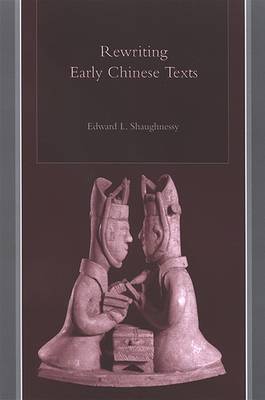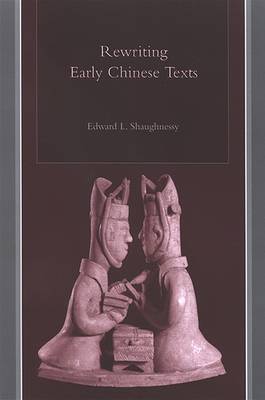
- Retrait gratuit dans votre magasin Club
- 7.000.000 titres dans notre catalogue
- Payer en toute sécurité
- Toujours un magasin près de chez vous
- Retrait gratuit dans votre magasin Club
- 7.000.0000 titres dans notre catalogue
- Payer en toute sécurité
- Toujours un magasin près de chez vous
Description
Rewriting Early Chinese Texts examines the problems of reconstituting and editing ancient manuscripts that will revise--indeed "rewrite"--Chinese history. It is now generally recognized that the extensive archaeological discoveries made in China over the last three decades necessitate such a rewriting and will keep an army of scholars busy for years to come. However, this is by no means the first time China's historical record has needed rewriting. In this book, author Edward L. Shaughnessy explores the issues involved in editing manuscripts, rewriting them, both today and in the past.
The book begins with a discussion of the difficulties encountered by modern archaeologists and paleographers working with manuscripts discovered in ancient tombs. The challenges are considerable: these texts are usually written in archaic script on bamboo strips and are typically fragmentary and in disarray. It is not surprising that their new editions often meet with criticism from other scholars. Shaughnessy then moves back in time to consider efforts to reconstitute similar bamboo-strip manuscripts found in the late third century in a tomb in Jixian, Henan. He shows that editors at the time encountered many of the same difficulties faced by modern archaeologists and paleographers, and that the first editions produced by a court-appointed team of editors quickly prompted criticism from other scholars of the time. Shaughnessy concludes with a detailed study of the editing of one of these texts, the Bamboo Annals (Zhushu jinian), arguably the most important manuscript ever discovered in China. Showing how at least two different, competing editions of this text were produced by different editors, and how the differences between them led later scholars to regard the original edition--the only one still extant--as a forgery, Shaughnessy argues for this text's place in the rewriting of early Chinese history.
The book begins with a discussion of the difficulties encountered by modern archaeologists and paleographers working with manuscripts discovered in ancient tombs. The challenges are considerable: these texts are usually written in archaic script on bamboo strips and are typically fragmentary and in disarray. It is not surprising that their new editions often meet with criticism from other scholars. Shaughnessy then moves back in time to consider efforts to reconstitute similar bamboo-strip manuscripts found in the late third century in a tomb in Jixian, Henan. He shows that editors at the time encountered many of the same difficulties faced by modern archaeologists and paleographers, and that the first editions produced by a court-appointed team of editors quickly prompted criticism from other scholars of the time. Shaughnessy concludes with a detailed study of the editing of one of these texts, the Bamboo Annals (Zhushu jinian), arguably the most important manuscript ever discovered in China. Showing how at least two different, competing editions of this text were produced by different editors, and how the differences between them led later scholars to regard the original edition--the only one still extant--as a forgery, Shaughnessy argues for this text's place in the rewriting of early Chinese history.
Spécifications
Parties prenantes
- Auteur(s) :
- Editeur:
Contenu
- Nombre de pages :
- 296
- Langue:
- Anglais
- Collection :
Caractéristiques
- EAN:
- 9780791466445
- Date de parution :
- 01-06-06
- Format:
- Livre broché
- Format numérique:
- Trade paperback (VS)
- Dimensions :
- 154 mm x 229 mm
- Poids :
- 408 g

Les avis
Nous publions uniquement les avis qui respectent les conditions requises. Consultez nos conditions pour les avis.






